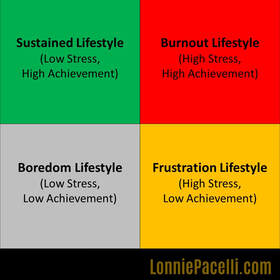
In 2004, I left Microsoft so Patty and I could homeschool our son Trevor. He was diagnosed with Autism Spectrum Disorder at age five, and we decided as he was entering seventh grade that he would need more help than what his public school could offer. I was his math and science teacher for two years until he re-entered public school in ninth grade. After my homeschooling stint, I decided to focus on writing and consulting, and later Patty and I starting a publishing business. From that point until now, I have regularly been asked if I’m “retired.” At first, I would respond with a strong “no” due to my opinion that retirees spend their days on the golf course or playing bridge. Over time, though, I recognized I had to come up with a better description of what I do as a profession. It’s not a choice of either the golf course or the 8-to-5 grind. For me, it’s something I call sustained lifestyle.
So, what’s sustained lifestyle? Here’s the definition, then we’ll unpack it:
Sustained lifestyle is when you have a high sense of achievement accompanied by a low degree of stress, making it something you can sustain for a long time.
First let’s talk about achievement. This is about doing something meaningful that accomplishes a desired result which gives you joy. It could be delivering a project on time, helping people in need, or coaching lesser experienced professionals. It’s about getting something done that matters to you and seeing the fruits of your labor. Next is stress. This is the degree of mental, physical or emotional strain undertaken to achieve a desired result. Delivering a project on time with high-pressure executive meetings, project team infighting, and an unreasonable customer is much more taxing than one with cooperative execs, project team members, and customers. The end result is a completed project, but the execution was like pedaling uphill in tenth gear. 
When stress and achievement are combined in the context of lifestyle, one of the four results are realized:
A frustration lifestyle is the result of high stress accompanied by low achievement. Think burning the midnight oil on projects that get cancelled last-minute or never used. A boredom lifestyle is the result of low stress accompanied by low achievement. Think getting up every morning with nothing to do. A burnout lifestyle is the result of high stress accompanied by high achievement. Think successive strategic projects with demanding customers, a dysfunctional team, and irrational management. A sustained lifestyle is the result of low stress accompanied by high achievement. Think volunteering for a cause you’re passionate about on your work terms.
Now don’t get me wrong; I’m in no way saying that a sustained lifestyle means no stress. There are certainly things in life that crop up and cause great stress. However, a sustained lifestyle gives you margin to handle unexpected stress more effectively than if your stress bucket were already full.
Here are eight tips to create a sustained lifestyle that’s enjoyable and fulfilling for you:
Whether you’re at retirement age, close to it, or merely thinking about it, keep the concept of a sustained lifestyle front and center. Think high achievement and low stress.
1 Comment
4/1/2021 11:55:25 pm
Thanks for the tip about how having goals will help in planning out one's retirement. I'm interested in looking for a private retirement consulting session soon. I'm about to hit my late thirties so it would be important to start thinking about how I can prepare for the later state of my life.
Reply
Leave a Reply. |
Topics
All
Reprints
Contact Lonnie about article reprints. Please specify article you wish to reprint. Backlist
See Lonnie's Amazon Author Page Archives
July 2024
|
Lonnie Pacelli - Building Thriving Leaders™
Insightful | Creative | Direct Advice to Help Leaders Help Themselves
Keynote Speaker | Board Director | Autism Advocate | Author | Project Management Expert | Microsoft/Accenture Veteran
See his books on Amazon
Insightful | Creative | Direct Advice to Help Leaders Help Themselves
Keynote Speaker | Board Director | Autism Advocate | Author | Project Management Expert | Microsoft/Accenture Veteran
See his books on Amazon
Services |
About
|
© COPYRIGHT 2019. ALL RIGHTS RESERVED.
We are a participant in the Amazon Services LLC Associates Program, an affiliate advertising program designed to provide a means for us to earn fees by linking to Amazon.com and affiliated sites.
|

 RSS Feed
RSS Feed